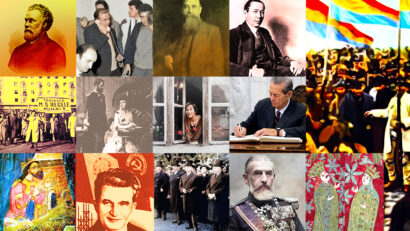Youth, Tourism, and Education in Socialist Romania
Educating the youth in the spirit of Marxist-Leninist ideology became a major national project after 1945

Steliu Lambru, 25.05.2023, 00:34
On March 6, 1945, the government led by Petru Groza, government of an alliance led by the communist party, which put Romania in the orbit of the USSR, was installed in Bucharest. Thus, educating the youth in the spirit of Marxist-Leninist ideology became the only national project and it was systematically implemented. Between 1945 and 1965, there was a period of post-war recovery and peace treaty reparations in Romania, so tourism and leisure were restricted. Starting in the mid-1960s, economic revival has also led to the revitalization of tourism. But the emergence of tourism under the tutelage of the youth organizations of the Communist Party, in which ideology and the acquisition of knowledge were combined, was a loan from the Soviet Union. It was about the so-called purpose tourism, so named to distinguish it from tourism in the West. In this sense, the ‘Cutezătorii’ expeditions excelled after the name of the magazine of the same name published in 1967. The name means The Audacious Ones. Started in 1969, the ‘Cutezătorii’ expeditions for primary and secondary school children were organized until 1989.
Diana Georgescu teaches Southeast European studies at University College London, and described the organizational framework of the ‘Cutezătorii’ expeditions.
The ’60s, when the competition was initiated, were generally years of reforms and changes, and this can also be seen in the case of the Pioneers’ organization. It goes through a series of reforms that more or less institutionally removes it from the tutelage of the Communist Youth Organization, and becomes an independent organization with a president, vice president, and all kinds of commissions on sports and tourism, art, and science .
In order to give them a tradition and to mobilize the participants in the ‘Cutezătorii’ expeditions, references were made to similar organizations from the past such as the Scouts of Romania. The most reproduced exhortation appeared truncated in almost all Pioneer journals [the communist version of the Scouts]. It was a fragment from historian Nicolae Iorga’s speech entitled On the purpose of scouting: ‘The purpose of scouting is to make you go beyond the words of books to see the true and beautiful thing that is found in nature itself.’ The expeditions took place in the Carpathian Mountains, along the rivers, in the Danube Delta, etc. The camps entailed displacement from the house and resettlement in the collective, and aimed to form life experience, to promote knowledge of the country and culture, to teach the children the relationship with the state and with socialist society. For the ‘Cutezătorii’ expeditions, teams of teachers and students were formed, and patriotic education was carried out within them, but knowledge of anthropology, history, ethnography, folklore, botany, zoology, geography, environment, ecology was also provided. Expedition journals were also kept. Prizes were awarded to participating teams who submitted their expedition logs and collections of objects to judges. Diana Georgescu:
The ‘Cutezătorii’ expeditions were not a mandatory activity, but Pioneer activities were encouraged, and were something that had to be done. They were being popularized, and I was surprised to learn that people were putting in so much effort, both financially and physically. The expeditions lasted 3-4 weeks, they had strict rules, you were only allowed to use means of public transportation to reach the initial point of the route. You had to walk, you had to live in a tent in a self-service regime. Members had to cook for themselves, get their own food.
It is estimated that, for more than 20 years, 30,000 teams, with a workforce of approximately 500,000 pioneers, participated in the ‘Cutezătorii’ expeditions. Diana Georgescu talked with one of those who participated and found out what he thinks today about what it was then.
In an interview with a guy who wrote about the experience on his blog, an expedition to Ceahlău in 1978, I asked him what was the impact of the expedition on him. He said the expedition had created a drug atmosphere. After they returned from the expedition, the entire vacation had been just them, the gang. They would see each other in the afternoon and evening, and tell the same stories. They had practically relived the entire expedition on vacation and remained friends. And the teachers, most of them, similarly started recounting their memories with I was young, I liked children. I liked the answer of a Romanian language teacher from Satu Mare who led a mixed Romanian-Hungarian crew. She said that back then there were teachers with a soul, who did their job with devotion and, in general, one can see an attempt to recover a kind of pride, professional dignity. Not because it was imposed on them, during the imposed hours of political indoctrination that no one did with any heart. But on an expedition, on a trip, there were no politics. It was life, as it was, food had to be made, the road had to be walked, it was real life. Here is a political project. The moment the project’s values are internalized, when people resonate with its values, it no longer seems political. The ‘Cutezătorii’ expeditions, even if they continued out of inertia for a few years after 1989, disappeared. What remains are the memories of generations printed on paper, photography, and film.





























